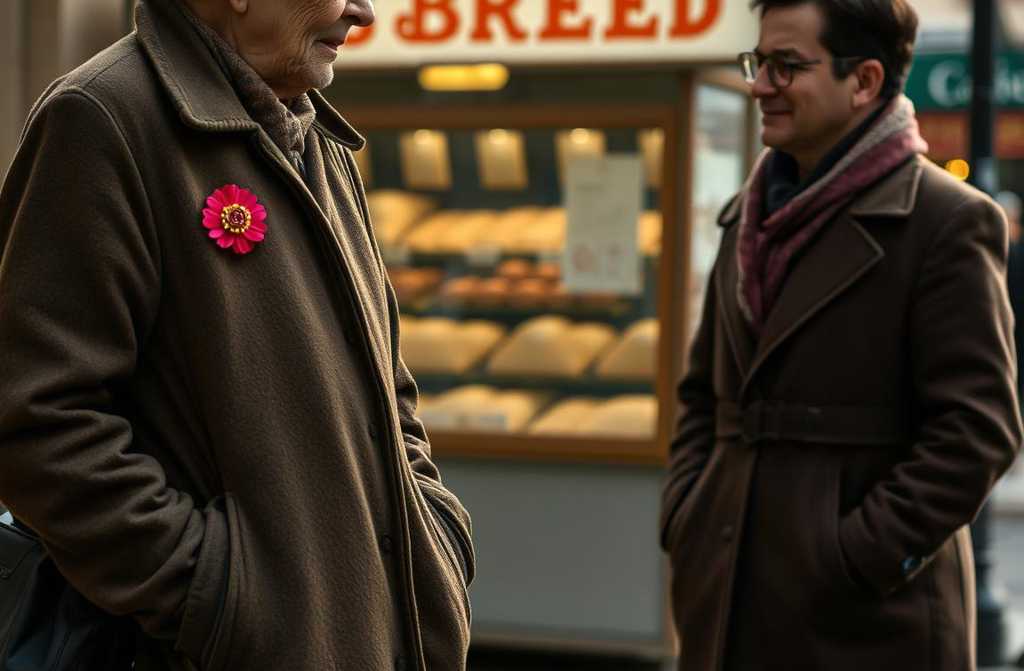“Please, love, have pity on me… I haven’t eaten bread in three days, and I’ve no money left,” the old woman pleaded with the bakery stall keeper.
The bitter winter wind cut through the narrow lanes of London’s older quarters, whispering past the soot-stained brickwork as if mourning the days when folk still had warmth in their hearts and honesty in their eyes. Against the drab shopfronts and peeling posters stood an elderly woman, her face a map of fine wrinkleseach line a story of hardship, endurance, and faded dreams. In her hands, she clutched a worn sack filled with empty glass bottles, the last remnants of a life now gone. Her eyes were wet; tears trickled down her cheeks, slow to vanish in the cold.
“Please, dear, show me some kindness…” she murmured, her voice trembling like a leaf in the wind. “It’s been three days without bread. I havent got a single penny… not even enough for a slice.”
Her words hung in the air, but behind the bakerys glass counter, the shopgirl only shook her head, her expression unfeeling. Her stare was icy, sharp as frost.
“Hows that my problem?” she snapped. “This is a bakery, not a bottle return. Cant you read? The signs clear as daybottles go to the recycling centre, and theyll give you money for them. Money for bread, for food, for life. What dyou want from me?”
The old woman faltered. She hadnt known the recycling centre closed by noon. She was too late. Too late for that slim chance to stave off hunger. Shed never thought to collect bottles before. Once, shed been a teachera woman with a degree, with pride, with dignity shed clung to even in the hardest times. But now… now she stood by the stall like a beggar, shame burning inside her.
“Look,” the shopgirl relented slightly, “youll have to wake earlier. Bring the bottles in tomorrow morning, and Ill see you right.”
“Please,” the woman begged, “just a quarter loaf… Ill pay you back tomorrow. My heads spinning… I cant… I cant bear this hunger any longer.”
Not a shred of sympathy touched the shopgirls face.
“No,” she said flatly. “Im not running a charity. Ive barely enough for myself. Every day its someone else begging. Move alongyoure holding up the queue.”
A man in a charcoal overcoat stood nearby, lost in thought. He seemed miles away, wrapped up in his own worlda world of business, decisions, the future. The shopgirl brightened at once, as though a valued customer had appeared, not just another face in the crowd.
“Good afternoon, Mr. Whitmore!” she chirped. “Your favourite loafs just inthe walnut and raisin. And the pastries are fresh, apricot-filled. The cherry ones are from yesterday, but still lovely.”
“Afternoon,” he replied absently. “Ill take the walnut loaf and half a dozen pastries… cherrys fine.”
“Apricot, then?” she pressed, smiling.
“Either,” he muttered. “Apricot, if you prefer.”
He pulled out a thick wallet, handed over a crisp twenty-pound note, and waited in silence. Then his gaze drifted asideand stopped. He saw the elderly woman standing in the bakerys shadow. Her face was familiar. Deeply familiar. But his memory refused to place her. Only one detail stood outthe antique brooch pinned to her threadbare coat, shaped like a primrose. Something about it tugged at him… something dear.
The man climbed into his black Jaguar, set the bakery bag on the passenger seat, and drove off. His office wasnt faron the outskirts of London, in a modest but modern building. He disliked flashiness. Edward Whitmore, owner of a thriving electronics firm, had started from nothing back in the ’90s, when the country was all upheaval and every pound had to be earned the hard way. Through sheer grit, sharp wits, and relentless work, hed built an empireno handouts, no favours.
His homea grand cottage in Surreywas full of life. His wife, Charlotte, lived there, along with their two boys, Oliver and Henry, and soon a third child would arrivetheir long-awaited daughter. It was Charlottes call that unsettled him.
“Ed,” she said, worry in her voice, “the school rang again. Olivers been in another fight.”
“Darling, Im swamped today,” he sighed. “Supplier negotiationsif this deal falls through, we could lose millions.”
“But I cant manage alone,” she whispered. “Im exhausted, and with the baby coming… I dont want to face the headmaster by myself.”
“Then dont go,” he said at once. “Ill make time. And Oliver… hell get a thrashing if this keeps up.”
“Youre never home,” Charlotte murmured. “You leave before the boys wake and come back after theyre asleep. I worry about you. You never rest.”
“Thats the job,” he said, guilt pricking him. “But its all for the family. For you, for the boys, for our little girl.”
“Im sorry,” she whispered. “I just miss you.”
Edward worked late into the evening. When he got home, the boys were asleep, and Charlotte waited in the sitting room. She apologised for earlier, but he shook his head.
“Youre right,” he admitted quietly. “I work too much.”
She offered to heat dinner, but he declined.
“I ate at the office. Brought apricot pastriesfrom that bakery. Theyre excellent. And the walnut loaf…”
“The boys didnt finish it,” Charlotte remarked.
Edward fell silent. The old womans face surfaced in his mind. Something about her… something he should know. Not just her faceher bearing, her look, that brooch… And thenlike lightningit hit him.
“Could it be… her?” he breathed. “Margaret Hartley?”
His chest tightened. He remembered everything. The school, the classroom, her firm but kind eyes. How shed taught him maths, patiently explaining each sum. How, as a boy from a struggling family, hed lived with his grandmother in a tiny flat where sometimes there wasnt even bread. And she… shed noticed. Shed never let him feel ashamed. Shed invented little jobs for himtidying the classroom, watering plants, fixing a loose shelf. Then, without fail, thered be tea and toast. And bread… her homemade bread, warm from the oven, the crust crackling under his fingers.
“I have to find her,” he decided.
The next day, he rang an old school chum who worked for the Met. Within an hour, he had an address.
But it wasnt until Sunday, when work eased, that Edward could visit her. He bought a bouquetroses, carnations, a sprig of lavenderand drove to the ageing council estate where grey tower blocks had replaced the terraced houses of his childhood.
She opened the door. A gaunt face, weary eyes, but the same quiet dignity. He barely recognised her.
“Good afternoon, Mrs. Hartley,” he said, steadying his voice. “Im Edward Whitmore. You might not remember”
“I remember, Edward,” she replied softly. “I recognised you at the bakery. You seemed lost in thought… I wondered if you were ashamed to see me like this.”
“No!” he burst out. “I just didnt realise… Forgive me…”
She began to cry. He handed her the flowers. Her hands shook as she took them.
“The last time I had flowers was four years ago… on Teachers’ Day. I taught another year, then… they let me go. Said I was too old. And my pension… it doesnt come till Thursday. I cant even offer you tea…”
“Ive come to take you home,” Edward said firmly. “Weve a big house. Charlotte, the boys, and the babys due soon. We want you to live with us. Not as a guestas family.”
“No, Edward… I couldnt…”
“You can,” he interrupted. “Ive a job for you. Tutor my boys. Olivers a handful, Henrys a dreamer. And I… I want them to learn decency, hard work, kindness. Who better than you?”
She studied him a long moment. Then she nodded.
“Ill be seventy next year,” she said. “But Ill manage.”
An hour later, she packed her few things. By evening, she was settled in the Whitmore home.
From that day, everything changed. Inspired by Mrs. Hartleys wisdom, Charlotte spent hours with her, listening to tales of teaching, of children, of life. And the boys… they adored her at once. She cooked for them, helped with sums, read stories. And Oliver, the little troublemaker, grew quieter, calmer. He stopped fighting. He just… listened.
A week and a half later, their daughter was born. They named her Emily. When Edward brought Charlotte and the baby home, the boys rushed to them, shouting with joy.
“Mum!” Oliver cried. “We baked bread with Mrs. Hartley!”
“Its brilliant!” Henry added.
“Only,” Oliver said seriously, “Mrs. Hartley says its not the same as her old oven. Hers was better.”
Charlotte smiled. Edward glanced at Mrs. Hartley. There was light in her eyes again.
And in that moment, he knewhe hadnt saved her. Shed saved them all.







